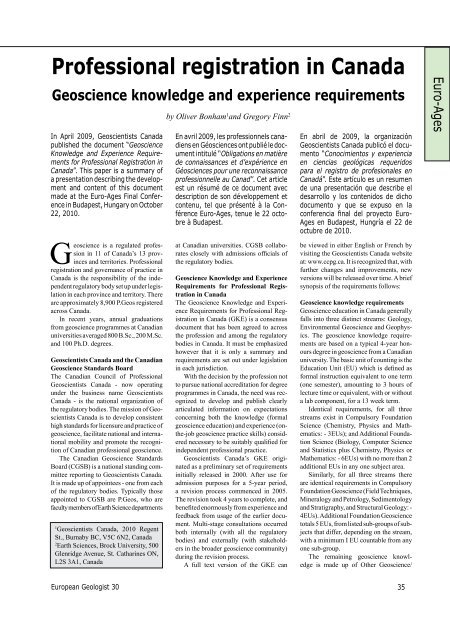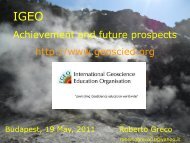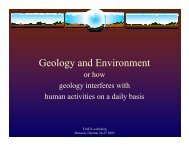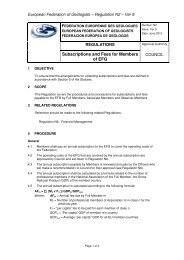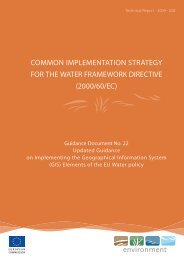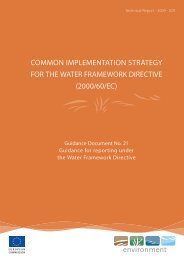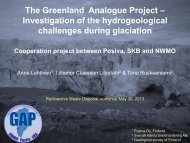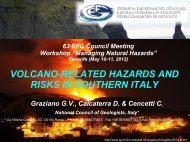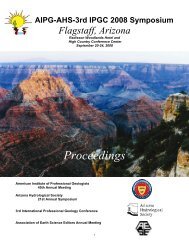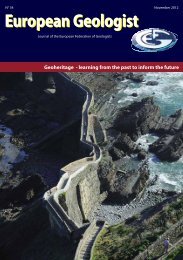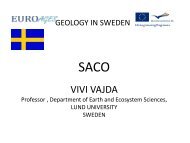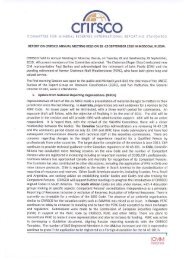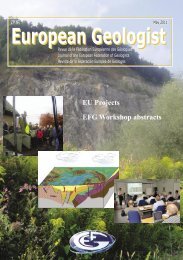EGM 30 download.pdf - European Federation of Geologists
EGM 30 download.pdf - European Federation of Geologists
EGM 30 download.pdf - European Federation of Geologists
You also want an ePaper? Increase the reach of your titles
YUMPU automatically turns print PDFs into web optimized ePapers that Google loves.
Pr<strong>of</strong>essional registration in CanadaGeoscience knowledge and experience requirementsIn April 2009, Geoscientists Canadapublished the document “GeoscienceKnowledge and Experience Requirementsfor Pr<strong>of</strong>essional Registration inCanada”. This paper is a summary <strong>of</strong>a presentation describing the developmentand content <strong>of</strong> this documentmade at the Euro-Ages Final Conferencein Budapest, Hungary on October22, 2010.by Oliver Bonham 1 and Gregory Finn 2En avril 2009, les pr<strong>of</strong>essionnels canadiensen Géosciences ont publié le documentintitulé ‘‘Obligations en matièrede connaissances et d’expérience enGéosciences pour une reconnaissancepr<strong>of</strong>essionnelle au Canad’’. Cet articleest un résumé de ce document avecdescription de son développement etcontenu, tel que présenté à la ConférenceEuro-Ages, tenue le 22 octobreà Budapest.En abril de 2009, la organizaciónGeoscientists Canada publicó el documento“Conocimientos y experienciaen ciencias geológicas requeridospara el registro de pr<strong>of</strong>esionales enCanadá”. Este artículo es un resumende una presentación que describe eldesarrollo y los contenidos de dichodocumento y que se expuso en laconferencia final del proyecto Euro-Ages en Budapest, Hungría el 22 deoctubre de 2010.Euro-AgesGeoscience is a regulated pr<strong>of</strong>essionin 11 <strong>of</strong> Canada’s 13 provincesand territories. Pr<strong>of</strong>essionalregistration and governance <strong>of</strong> practice inCanada is the responsibility <strong>of</strong> the independentregulatory body set up under legislationin each province and territory. Thereare approximately 8,900 P.Geos registeredacross Canada.In recent years, annual graduationsfrom geoscience programmes at Canadianuniversities averaged 800 B.Sc., 200 M.Sc.and 100 Ph.D. degrees.Geoscientists Canada and the CanadianGeoscience Standards BoardThe Canadian Council <strong>of</strong> Pr<strong>of</strong>essionalGeoscientists Canada - now operatingunder the business name GeoscientistsCanada - is the national organization <strong>of</strong>the regulatory bodies. The mission <strong>of</strong> GeoscientistsCanada is to develop consistenthigh standards for licensure and practice <strong>of</strong>geoscience, facilitate national and internationalmobility and promote the recognition<strong>of</strong> Canadian pr<strong>of</strong>essional geoscience.The Canadian Geoscience StandardsBoard (CGSB) is a national standing committeereporting to Geoscientists Canada.It is made up <strong>of</strong> appointees - one from each<strong>of</strong> the regulatory bodies. Typically thoseappointed to CGSB are P.Geos, who arefaculty members <strong>of</strong> Earth Science departments1Geoscientists Canada, 2010 RegentSt., Burnaby BC, V5C 6N2, Canada2Earth Sciences, Brock University, 500Glenridge Avenue, St. Catharines ON,L2S 3A1, Canadaat Canadian universities. CGSB collaboratesclosely with admissions <strong>of</strong>ficials <strong>of</strong>the regulatory bodies.Geoscience Knowledge and ExperienceRequirements for Pr<strong>of</strong>essional Registrationin CanadaThe Geoscience Knowledge and ExperienceRequirements for Pr<strong>of</strong>essional Registrationin Canada (GKE) is a consensusdocument that has been agreed to acrossthe pr<strong>of</strong>ession and among the regulatorybodies in Canada. It must be emphasizedhowever that it is only a summary andrequirements are set out under legislationin each jurisdiction.With the decision by the pr<strong>of</strong>ession notto pursue national accreditation for degreeprogrammes in Canada, the need was recognizedto develop and publish clearlyarticulated information on expectationsconcerning both the knowledge (formalgeoscience education) and experience (onthe-jobgeoscience practice skills) considerednecessary to be suitably qualified forindependent pr<strong>of</strong>essional practice.Geoscientists Canada’s GKE originatedas a preliminary set <strong>of</strong> requirementsinitially released in 2000. After use foradmission purposes for a 5-year period,a revision process commenced in 2005.The revision took 4 years to complete, andbenefited enormously from experience andfeedback from usage <strong>of</strong> the earlier document.Multi-stage consultations occurredboth internally (with all the regulatorybodies) and externally (with stakeholdersin the broader geoscience community)during the revision process.A full text version <strong>of</strong> the GKE canbe viewed in either English or French byvisiting the Geoscientists Canada websiteat: www.ccpg.ca. It is recognized that, withfurther changes and improvements, newversions will be released over time. A briefsynopsis <strong>of</strong> the requirements follows:Geoscience knowledge requirementsGeoscience education in Canada generallyfalls into three distinct streams: Geology,Environmental Geoscience and Geophysics.The geoscience knowledge requirementsare based on a typical 4-year honoursdegree in geoscience from a Canadianuniversity. The basic unit <strong>of</strong> counting is theEducation Unit (EU) which is defined asformal instruction equivalent to one term(one semester), amounting to 3 hours <strong>of</strong>lecture time or equivalent, with or withouta lab component, for a 13 week term.Identical requirements, for all threestreams exist in Compulsory FoundationScience (Chemistry, Physics and Mathematics:- 3EUs); and Additional FoundationScience (Biology, Computer Scienceand Statistics plus Chemistry, Physics orMathematics: - 6EUs) with no more than 2additional EUs in any one subject area.Similarly, for all three streams thereare identical requirements in CompulsoryFoundation Geoscience (Field Techniques,Mineralogy and Petrology, Sedimentologyand Stratigraphy, and Structural Geology: -4EUs). Additional Foundation Geosciencetotals 5 EUs, from listed sub-groups <strong>of</strong> subjectsthat differ, depending on the stream,with a minimum I EU countable from anyone sub-group.The remaining geoscience knowledgeis made up <strong>of</strong> Other Geoscience/<strong>European</strong> Geologist <strong>30</strong>35


